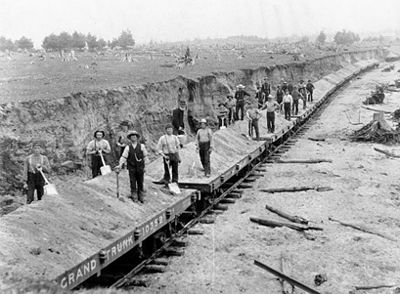The Canadian Union of Postal Workers (CUPW) is a labour union that represents over 55,000 members across Canada (2024). Members of the CUPW include Canada Post employees as well as couriers, vehicle mechanics, and other workers in the private sector. (See also Postal System.) Since 1965 the CUPW (previously Canadian Postal Employees Association) has represented members in numerous strikes, walkouts and lockouts over several complex labour issues. (See also Strikes and Lockouts.)
Postal Workers Strike
Postal workers picket outside a Canada Post sorting facility in Toronto, Ontario, 2 December 2024.
(photographer Cole Burston/Bloomberg via Getty Images)
Strike Activities
1960-70
The "big strike" of July 1965 was one of the largest Canadian "wildcat" strikes and the largest involving government employees. It played an important role in gaining collective bargaining rights for civil servants. The 1968 strike and the 1970 rotating 24-hour walkouts were mainly the result of wage grievances; the latter secured an increase above the Trudeau government's guidelines (see Pierre Elliott Trudeau; Liberal Party of Canada). Strikes in the 1970s centered on wages and the threats posed by automation. Demands included legal guarantees of job security and maintenance of existing job classifications, as well as firm controls over the use of casual and part-time employees.
Letter Carriers Picket
Letter carriers picket outside the Willowdale Depot on Yonge St., 15 November 1971.
(photo by Boris Spremo/Toronto Star via Getty Images)
In 1974 and 1975 the CUPW, under labour leader Joe Davidson, undertook long, bitter strikes which were successful in obtaining major protections concerning technological change. In 1976 and 1977, postal service was disrupted by a series of illegal regional strikes following a labour board decision that management had introduced changes without the promised consultation. A national strike in 1978 met with back-to-work legislation: union president Jean-Claude Parrot was jailed for refusing to comply, and relations became strained between the union and the Canadian Labour Congress.
Jean-Claude Parrot
Jean-Claude Parrot, president of the Canadian Union of Postal Workers, on the picket line with striking worker Erna Kunstek, 9 January 1987.
(photo by Ron Bull/Toronto Star via Getty Images)
1980-90
There was a strike-free settlement in 1980 which provided a reduced work week to compensate for the adverse effects of automation. In June 1981 workers struck over demands which included one for 17 weeks paid maternity leave. CUPW became the first federal civil service bargaining unit to win this concession.
On 16 October 1981 the Post Office Department became the Canada Post Corporation (CPC), a Crown corporation. The creation of the Crown corporation was something that the CUPW had been urging in the hope that it would streamline negotiations by placing the union under the Canada Labour Code (see Labour Law). Negotiations between the CUPW and the CPC brought a new agreement without a strike in 1985. In 1987 and 1991 the union engaged in rotating strikes against the government's plan to privatize postal counters. Both strikes were ended by special legislation. In 1995 the union negotiated a settlement without a strike which required the CPC to keep open the postal counters.
2010 to Present
On 2 June 2011, 48,000 workers represented by the CUPW began a series of rotating strikes citing concerns over modernization, sick leave and wages. By 14 June 2011, the CPC suspended operations, locking out workers (see Strikes and Lockouts). Stephen Harper’s Conservative government tabled back-to-work legislation, which included an imposed wage increase. CPC operations resumed on 27 June 2011.
Similarly, after failing to negotiate a new contract, the CUPW initiated a series of rotating strikes on 22 October 2018. Bill C-89, which legislated employees back to work, was passed on 22 November 2018. CPC and the CUPW renewed existing collective agreements in 2021.
After nearly a year of negotiations and failing to bargain new contracts, the CUPW issued a strike notice on 12 November 2024. The union’s demands included wage increases in line with inflation, improved benefits and protections against technological change. On 15 November, approximately 55,000 workers went on strike. At the request of Labour Minister Steven MacKinnon, the Canada Industrial Relations Board ordered workers to return to work on 17 December 2024. Existing collective agreements were extended to May 2025.
Key Terms: CUPW Postal Strikes
Collective Bargaining – The negotiation of wages and other working conditions by a labour union on behalf of a group of employees. (See also Collective Bargaining.)
Labour Union – A group of workers that forms to protect its members’ rights and to seek better pay, benefits and conditions. The term is often shortened to union.
Wildcat Strike – A work stoppage that is not authorized by a union.

 Share on Facebook
Share on Facebook Share on X
Share on X Share by Email
Share by Email Share on Google Classroom
Share on Google Classroom








